Inflammation is essentially a beneficial response of the immune system in combating infections and healing the body. However, prolonged inflammation can be harmful to organs. Effectively managing inflammation can help shorten treatment and recovery times.
Vitamins with Anti-Inflammatory Properties
A balanced diet can help improve both acute and chronic inflammation. Studies have shown that certain vitamins contain anti-inflammatory compounds that can be easily obtained through natural dietary sources or supplements (as directed by a physician).
Chronic inflammation can increase the risk of health issues such as type 2 diabetes and heart disease. Additionally, it is linked to other conditions like cancer and autoimmune diseases such as rheumatoid arthritis.
Below is a list of six vitamins that possess anti-inflammatory properties and are found in various foods. Supplementing vitamins through food is always the first recommendation from doctors regarding inflammation prevention, especially if you are overweight.
1. Vitamin A
Numerous studies have found that vitamin A can help prevent the immune system from overreacting and causing inflammation.
Vitamin A is available in two forms: Beta-carotene, which is a provitamin converted to vitamin A in the body, and vitamin A itself, which acts as an antioxidant to protect the body against free radicals. Insufficient vitamin A intake can increase the risk of Alzheimer’s disease.
Food Sources of Vitamin A
Vitamin A is found in animal-derived foods including milk and liver. Beta-carotene, the most common provitamin A, gives orange-colored foods their hue, such as sweet potatoes, carrots, watermelon, and papaya. Some dark green leafy vegetables are also rich in vitamin A.
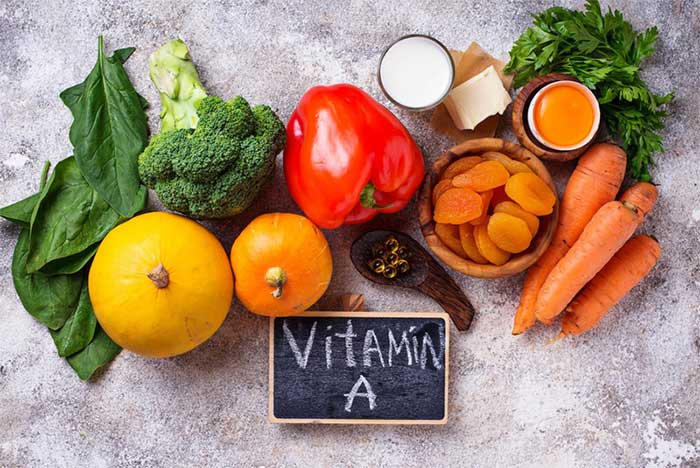
Foods with orange color are rich in Vitamin A. (Image: ST).
Note
- Excessive vitamin A supplementation can cause liver damage and birth defects. Beta-carotene supplements have been linked to a higher risk of lung cancer in smokers, even after quitting.
- Some weight loss medications like orlistat can make it harder for your body to absorb vitamin A, even with a sufficient diet.
- Medications for skin conditions like acitretin for psoriasis and isotretinoin for acne are synthetic forms of vitamin A, so do not take additional vitamin A supplements if you are on these medications.
2. B Vitamins
Individuals with low levels of vitamin B6 often have high levels of C-reactive protein, another compound that promotes inflammation, particularly in autoimmune diseases such as rheumatoid arthritis. One study found that low-dose daily supplementation of folic acid (another B vitamin) for a short period can reduce inflammation.
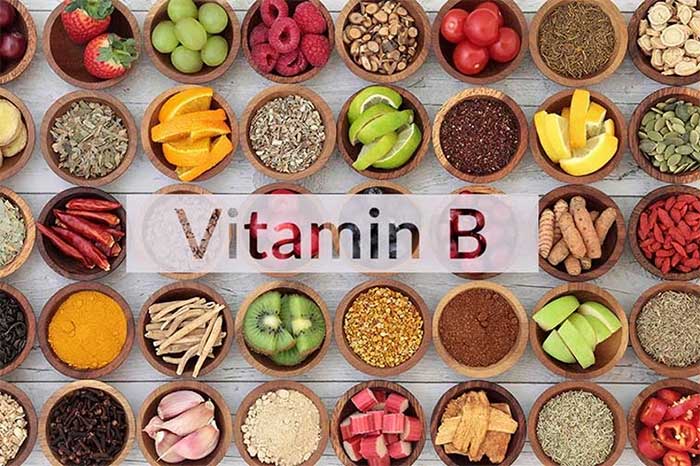
There are many sources of B vitamins in foods. (Image: ST).
Food Sources of B Vitamins
To reduce inflammation and increase vitamin B6, try consuming foods rich in B vitamins, such as black beans, dark leafy greens like kale, asparagus, bell peppers, mushrooms, tuna, and poultry. Eggs are also rich in vitamin B12 and folate, while dairy products provide B6. Therefore, consider adding nuts with milk to your breakfast.
- Excessive B6 supplementation can lead to skin lesions, increased sensitivity to sunlight, nausea, and even neurological agitation. However, insufficient B12 can also cause nerve damage.
- High levels of folic acid may increase cancer risk in some cases.
- Certain medications can affect B vitamin absorption, including metformin for diabetes and methotrexate for cancer, rheumatoid arthritis, and psoriasis. Additionally, consult a physician if you are being treated for asthma, lung issues, acid reflux, or stomach ulcers.
3. Vitamin C
Vitamin C has long been known as a compound that keeps the immune system healthy and better able to combat infections. Numerous studies also indicate that vitamin C can help eliminate free radicals that cause inflammation.
Similar to B vitamins, vitamin C helps reduce C-reactive protein levels. Although vitamin C supplements are convenient, you should still strive to obtain vitamin C through your diet.

Vitamin C has long been recognized as a compound that keeps the immune system healthy and effective against infections. (Image: ST)
Food Sources of Vitamin C
Citrus fruits, grapefruits, bell peppers, broccoli, and Brussels sprouts are all high in vitamin C. Some leafy greens and berries are also considered good sources of vitamin C for health.
- Your body can only handle a certain amount of vitamin C per day, so high-dose vitamin C supplementation can lead to stomach issues. Therefore, it is important to maintain a balanced diet.
- If you are undergoing cancer treatment or taking statins to lower cholesterol, you should avoid supplements like vitamin C and others until advised by a doctor.
4. Vitamin D
Research has long established the link between low vitamin D levels and the risk of various inflammatory diseases. Furthermore, researchers know that improving vitamin D levels can help reduce inflammation in the body. This trend has gained more attention during the COVID-19 pandemic.
Another report published in the Journal of Immunology also shows the anti-inflammatory effects of vitamin D and the benefits that those with low vitamin D levels can experience from supplementation.
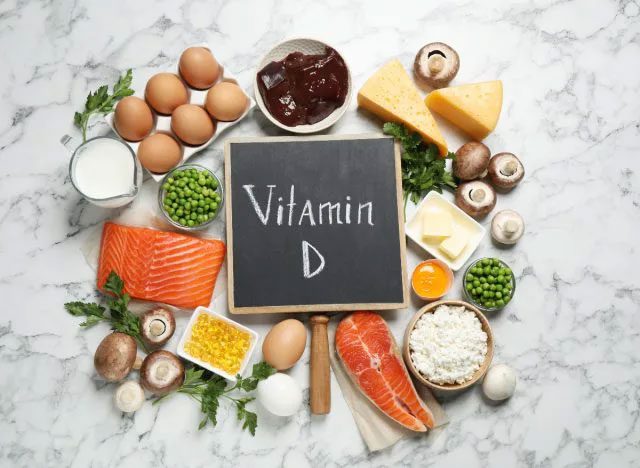
Research has long established the connection between low vitamin D levels and the risk of inflammatory diseases. (Image: ST).
Food Sources of Vitamin D
Vitamin D is produced naturally by the body after exposure to sunlight, but not everyone can obtain all their vitamin D this way. Foods that effectively supplement vitamin D include fatty fish, egg yolks, liver, beef, and vitamin D can also be added to certain foods like milk.
- If you are taking prescribed steroids for inflammation, you may find it harder to absorb vitamin D. Other medications that may reduce absorption include weight loss drugs like orlistat, cholesterol medications like cholestyramine, and anticonvulsants like phenobarbital or phenytoin.
- Excessive vitamin D is also harmful, disrupting calcium balance in the body and affecting the efficacy of certain heart or blood pressure medications.
5. Vitamin E
Vitamin E is another antioxidant vitamin, meaning it also has anti-inflammatory effects. Results from a 2015 meta-analysis reported in the European Journal of Clinical Nutrition confirmed that vitamin E has anti-inflammatory properties and that supplementation may be beneficial for those with inflammatory diseases.
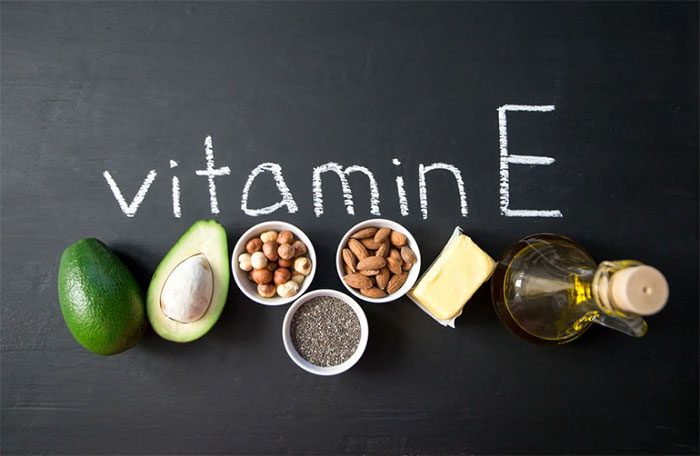
Vitamin E is another antioxidant vitamin, which means it also reduces inflammation. (Image: Internet).
Food Sources of Vitamin E
Vitamin E is abundant in nuts such as almonds and sunflower seeds. Other common sources of vitamin E include fruits and vegetables like avocados and spinach (dark leafy greens).
- You may be at an increased risk of bleeding if you are using blood thinners like warfarin (Coumadin) or taking daily aspirin and vitamin E supplements.
- Many doctors also do not recommend vitamin E supplementation if you are undergoing chemotherapy or radiation treatment for cancer.
6. Vitamin K
A report in the Journal of Metabolism indicates that vitamin K can reduce signs of inflammation, aid in blood clotting, and support bone health. Although vitamin K is essential for bone health, most people do not consume enough vitamin K in their daily diet.
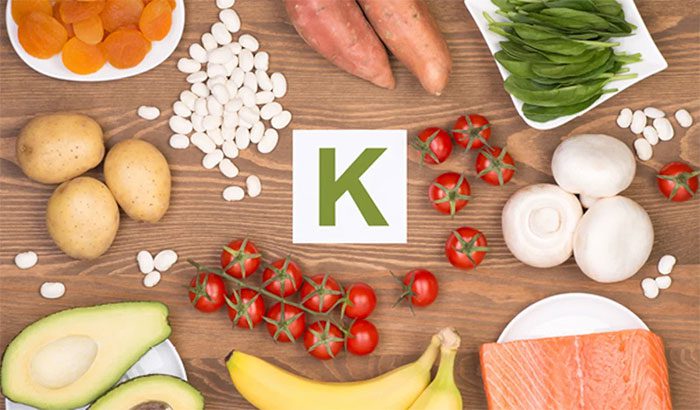
Although vitamin K is necessary for bone health, most people do not get enough vitamin K in their daily diet. (Image: ST).
Food Sources of Vitamin K
There are two types of vitamin K: K1 and K2. Vitamin K1 is found in leafy vegetables, including kale, spinach, broccoli, and Brussels sprouts; while vitamin K2 is found in chicken, liver, and eggs.
If you are using warfarin as a blood thinner, it is essential to maintain a stable intake of vitamin K to ensure your medication works effectively.
In summary, incorporating vitamins that help reduce inflammation through your diet is a wise and safe choice for the body. If you plan to use additional supplements, it is essential to consult your doctor.


















































